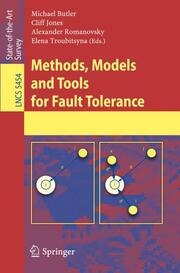Detailansicht
Methods, Models and Tools for Fault Tolerance
Lecture Notes in Computer Science 5454 - Programming and Software Engineering
ISBN/EAN: 9783642008665
Umbreit-Nr.: 1939554
Sprache:
Englisch
Umfang: viii, 343 S.
Format in cm:
Einband:
kartoniertes Buch
Erschienen am 26.03.2009
Auflage: 1/2009
- Zusatztext
- The growing complexity of modern software systems increases the di?culty of ensuring the overall dependability of software-intensive systems. Complexity of environments, in which systems operate, high dependability requirements that systems have to meet, as well as the complexity of infrastructures on which they rely make system design a true engineering challenge. Mastering system complexity requires design techniques that support clear thinking and rigorous validation and veri?cation. Formal design methods help to achieve this. Coping with complexity also requires architectures that are t- erant of faults and of unpredictable changes in environment. This issue can be addressed by fault-tolerant design techniques. Therefore, there is a clear need of methods enabling rigorous modelling and development of complex fault-tolerant systems. This bookaddressessuchacuteissues indevelopingfault-tolerantsystemsas: - Veri?cation and re?nement of fault-tolerant systems - Integrated approaches to developing fault-tolerant systems - Formal foundations for error detection, error recovery, exception and fault handling - Abstractions, styles and patterns for rigorousdevelopment of fault tolerance - Fault-tolerant software architectures - Development and application of tools supporting rigorous design of depe- able systems - Integrated platforms for developing dependable systems - Rigorous approaches to speci?cation and design of fault tolerance in novel computing systems TheeditorsofthisbookwereinvolvedintheEU(FP-6)projectRODIN(R- orous Open Development Environment for Complex Systems), which brought together researchers from the fault tolerance and formal methods communi- 1 ties. In 2007 RODIN organized the MeMoT workshop held in conjunction with the Integrated Formal Methods 2007 Conference at Oxford University.
- Kurztext
- The growing complexity of modern software systems makes it increasingly difficult to ensure the overall dependability of software-intensive systems. Mastering system complexity requires design techniques that support clear thinking and rigorous validation and verification. Formal design methods together with fault-tolerant design techniques help to achieve this. Therefore, there is a clear need for methods that enable rigorous modeling and the development of complex fault-tolerant systems. This book is an outcome of the workshop on Methods, Models and Tools for Fault Tolerance, MeMoT 2007, held in conjunction with the 6th international conference on Integrated Formal Methods, iFM 2007, in Oxford, UK, in July 2007. The authors of the best workshop papers were asked to enhance and expand their work, and a number of well-established researchers working in the area contributed invited chapters in addition. From the 15 refereed and revised papers presented, 12 are versions reworked from the workshop and 3 papers are invited. The articles are organized in four topical sections on: formal reasoning about fault-tolerant systems and protocols; fault tolerance: modelling in B; fault tolerance in system development process; and fault-tolerant applications.
- Autorenportrait
- InhaltsangabeFormal Reasoning about Fault Tolerant Systems and Protocols.- Graphical Modelling for Simulation and Formal Analysis of Wireless Network Protocols.- Reasoning about System-Degradation and Fault-Recovery with Deontic Logic.- Temporal Verification of Fault-Tolerant Protocols.- Design and Verification of Fault-Tolerant Components.- Dynamically Detecting Faults via Integrity Constraints.- Fault Tolerance: Modelling in B.- Event-B Patterns for Specifying Fault-Tolerance in Multi-agent Interaction.- Formal Reasoning about Fault Tolerance and Parallelism in Communicating Systems.- Formal Development of a Total Order Broadcast for Distributed Transactions Using Event-B.- Model-Based Testing Using Scenarios and Event-B Refinements.- Fault Tolerance in System Development Process.- Recording Process Documentation in the Presence of Failures.- DREP: A Requirements Engineering Process for Dependable Reactive Systems.- Documenting the Progress of the System Development.- Fault Tolerance Requirements Analysis Using Deviations in the CORRECT Development Process.- Fault Tolerant Applications.- Step-Wise Development of Resilient Ambient Campus Scenarios.- Using Inherent Service Redundancy and Diversity to Ensure Web Services Dependability.
